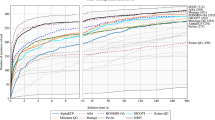Abstract
The classical greedy algorithm for discrete optimization problems where the optimal solution is a maximal independent subset of a finite ground set of weighted elements, can be defined in two ways which are dual to each other. The Greedy-In where a solution is constructed from the empty set by adding the next best element, one at a time, until we reach infeasibility, and the Greedy-Out where starting from the ground set we delete the next worst element, one at a time, until feasibility is reached. It is known that while the former provides an approximation ratio for maximization problems, its worst case performance is not bounded for minimization problems, and vice-versa for the later. However the Greedy-Out algorithm requires an oracle for checking the existence of a maximal independent subset which for most discrete optimization problems is a difficult task. In this work we present a Greedy-Out algorithm for the quadratic assignment problem by providing a combinatorial characterization of its solutions.
Similar content being viewed by others
References
Burkard R.E., Çela E., Pardalos P.M., Pitsoulis L.S.: The quadratic assignment problem. In: Pardalos, P.M., Pardalos, P.M. (eds) Handbook of Combinatorial Optimization, vol. 3, pp. 241–337. Kluwer Academic Publishers, Boston (1998)
Çela E.: The Quadratic Assignment Problem: Theory and Algorithms. Kluwer Academic Publishers, Dordrecht (1998)
Edmonds J.: Matroids and the greedy algorithm. Math. Program. 1, 127–136 (1971)
Faigle U.: The greedy algorithm for partially ordered sets. Discret. Math. 28, 153–159 (1979)
Frieze A.M.: Complexity of a 3-dimensional assignment problem. Eur. J. Oper. Res. 13, 161–164 (1983)
Gale D.: Optimal assignments in an ordered set: an application of matroid theory. J. Combin. Theory 4, 176–180 (1968)
Hausmann D., Korte B.: K-greedy algorithms for independence systems. Math. Methods Oper. Res. 22(1), 219–228 (1978)
Hausmann D., Korte B., Jenkyns T.A.: Worst case analysis of greedy type algorithms for independence systems. Math. Program. Study 12, 120–131 (1980)
Helman P., Moret B.M.E., Shapiro H.D.: An exact characterization of greedy structures. SIAM J. Discret. Math. 6(2), 274–283 (1993)
Kernighan B., Lin S.: An efficient heuristic procedure for partitioning graphs. Bell Syst. J. 49, 291–307 (1972)
Koopmans T.C., Beckmann M.J.: Assignment problems and the location of economic activities. Econometrica 25, 53–76 (1957)
Korte, B., Lovász, L.: Mathematical structures underlying greedy algorithms. In: Fundamentals of Computation Theory, vol. 117 of Lecture Notes in Computer Science, pp. 205–209. Springer (1981)
Korte B., Vygen J.: Combinatorial Optimization: Theory and Algorithms, 2nd edn. Springer, Berlin (2002)
Korte B., Monma C.L.: Some remarks on a classification of oracle-type algorithms. Int. Ser. Numer. Math. 46, 195–215 (1979)
Krokhmal P., Grundel D., Pardalos P.M.: Asymptotic behavior of the expected optimal value of the multidimensional assignment problem. Math. Program. 109(2–3), 525–551 (2007)
Krokhmal P., Pardalos P.M.: Random assignment problems. Eur. J. Oper. Res. 194(1), 1–17 (2009)
Lawler E.L.: The quadratic assignment problem. Manag. Sci. 9, 586–599 (1963)
Pardalos P.M., Rendl F., Wolkowicz H.: The quadratic assignment problem: a survey and recent developments. In: Pardalos, P.M., Wolkowicz, H. (eds) Quadratic assignment and related problems, volume 16 of DIMACS Series on Discrete Mathematics and Theoretical Computer Science, pp. 1–42. American Mathematical Society, Providence (1994)
Queyranne M.: Performance ratio of heuristics for triangle inequality quadratic assignment problems. Oper. Res. Lett. 4, 231–234 (1986)
Rado R.: A note on independence functions. Proc. Lond. Math. Soc. 7, 300–320 (1957)
Sahni S., Gonzalez T.: P-complete approximation problems. J. Assoc. Comput. Mach. 23, 555–565 (1976)
Author information
Authors and Affiliations
Corresponding author
Rights and permissions
About this article
Cite this article
Gevezes, T.P., Pitsoulis, L.S. A new greedy algorithm for the quadratic assignment problem. Optim Lett 7, 207–220 (2013). https://doi.org/10.1007/s11590-011-0409-9
Received:
Accepted:
Published:
Issue Date:
DOI: https://doi.org/10.1007/s11590-011-0409-9




